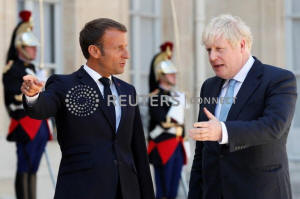Encouraged by Johnson's visit, UK officials now hoping rest of EU agrees
to work on Brexit solution
 Send a link to a friend
Send a link to a friend
 [August 24, 2019]
LONDON (Reuters) - Britain is hoping
the rest of the European Union falls in behind France and Germany and
agrees to work on solving a deadlock over Brexit, with officials sensing
a glimmer of hope after meetings this week, but conscious of the need
for a wider consensus in Europe. [August 24, 2019]
LONDON (Reuters) - Britain is hoping
the rest of the European Union falls in behind France and Germany and
agrees to work on solving a deadlock over Brexit, with officials sensing
a glimmer of hope after meetings this week, but conscious of the need
for a wider consensus in Europe.
Britain is on course to leave the EU, its biggest trading partner, on
Oct. 31 without any formal deal to soften the unprecedented divorce,
unless both sides agree to reopen stalled talks and find a way to
resolve their differences.
This week, some British newspapers cheered what they called a major
breakthrough and sterling rose after both German Chancellor Angela
Merkel and French President Emmanuel Macron offered Prime Minister Boris
Johnson what he described as "positive noises" on their willingness to
consider an exit deal agreement.

But Berlin, Paris and Brussels said the bloc's position had not altered:
the Withdrawal Agreement struck last year by then-prime minister Theresa
May will not be changed much. And the clock is ticking.
British officials were also keen to douse talk of a big diplomatic
victory but said they were pleased at the way the prime minister's first
foreign visits had gone and that there had been a clear willingness to
talk about solutions.
A separate source in Johnson's office said that while the meetings had
been a success in terms of building rapport between the prime minister
and the EU's two most powerful leaders, the rest of the bloc needed to
show the same desire to work on a solution.
The source said Johnson would not make the mistake of thinking Merkel
alone could deliver a new deal for Britain, criticizing previous
governments for being too keen on the idea that the German chancellor
could be Britain's "savior".
[to top of second column]
|

French President Emmanuel Macron welcomes British Prime Minister
Boris Johnson before a meeting on Brexit at the Elysee Palace in
Paris, France, August 22, 2019. REUTERS/Gonzalo Fuentes

In an encouraging sign, Dutch Prime Minister Mark Rutte said on
Friday he would be willing to listen to alternative plans for the
Irish backstop - the biggest stumbling point to agreement - but
warned there was no easy solution.
The need for broader support is likely to be relayed to Donald Tusk,
President of the European Council that brings together all EU member
states' leaders, when he meets Johnson on Sunday at a G7 summit in
the French resort of Biarritz.
The meeting with Tusk, who has been a consistent critic of Britain's
decision to leave the EU and its handling of negotiations, will give
some indication on how much appetite there is to work for a deal
among the rest of the bloc.
(Reporting by William James; editing by Stephen Addison)
[© 2019 Thomson Reuters. All rights
reserved.]
Copyright 2019 Reuters. All rights reserved. This material may not be published,
broadcast, rewritten or redistributed.
Thompson Reuters is solely responsible for this content.
 |